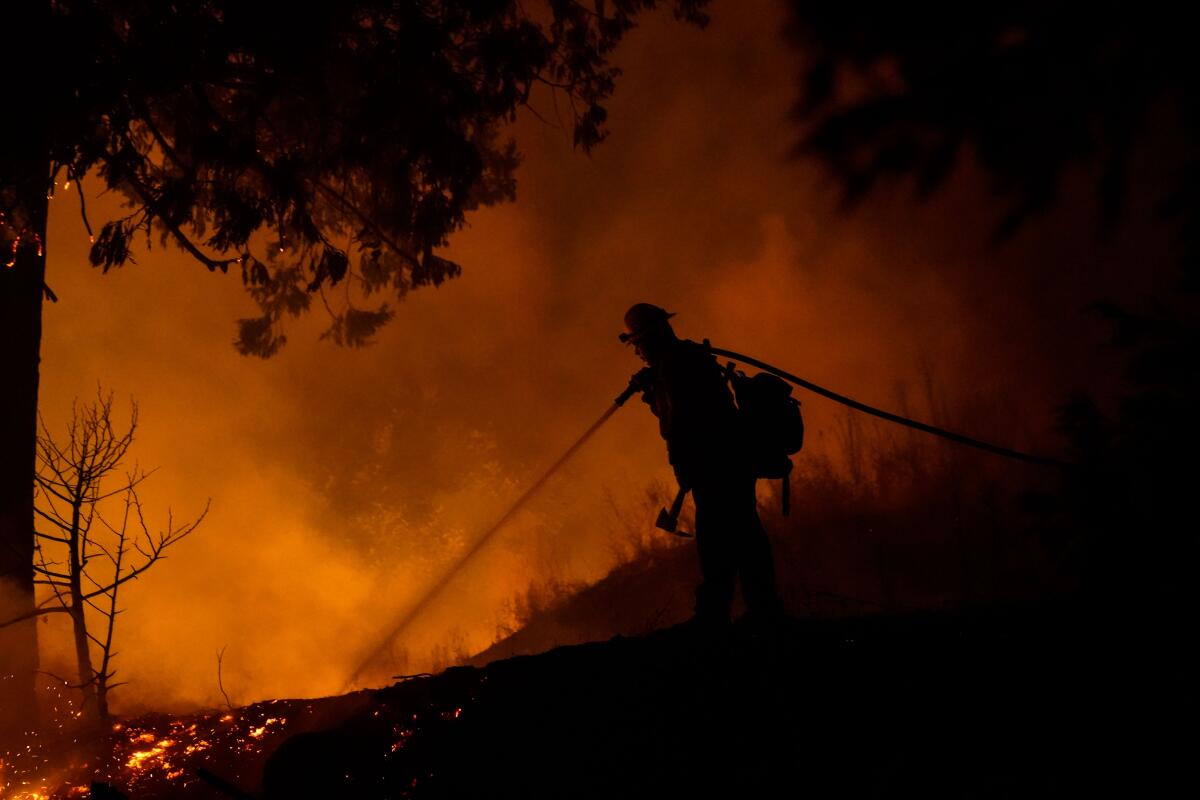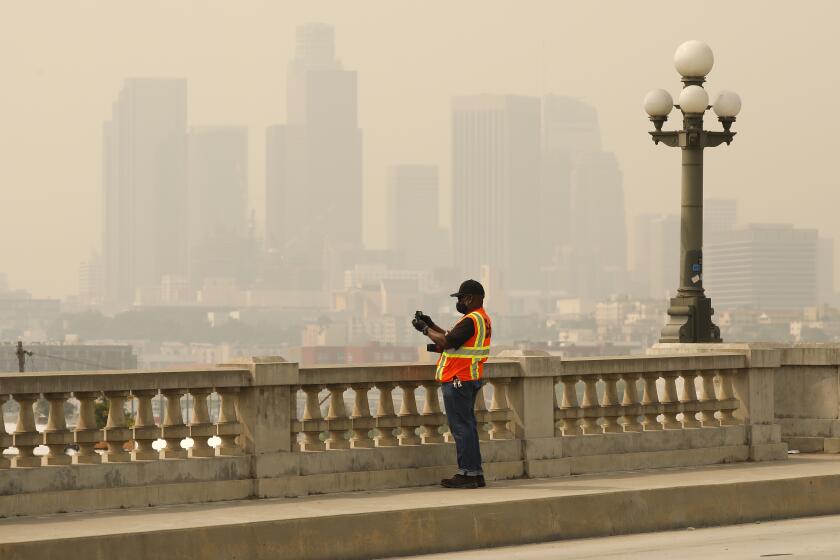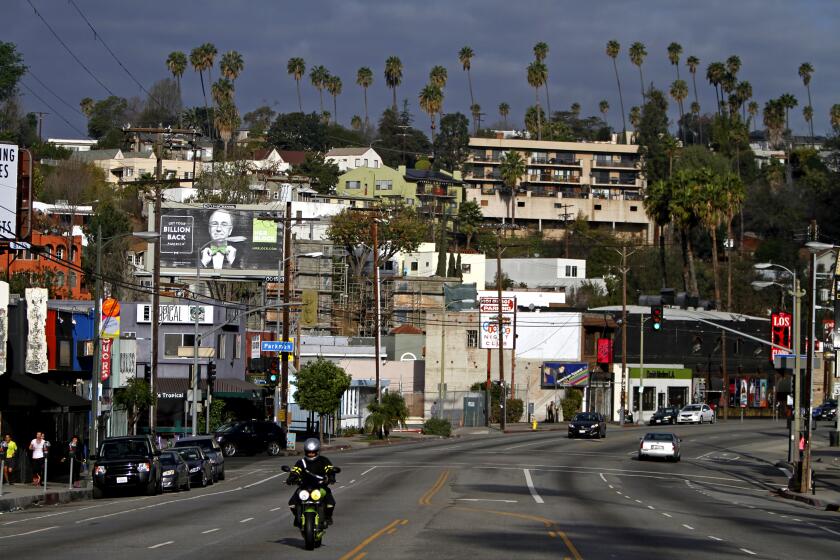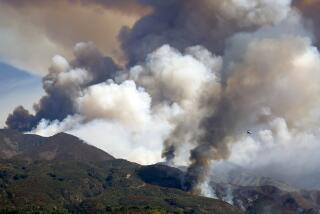Column: California fires debunk La La Land stereotype. We’re tougher than you think

Around this time last year, my daughter texted that a building was on fire a few blocks away from her North Philadelphia apartment. She had gone out on the street to film it and the images — of what was, mercifully, an empty four-story structure blazing like a torch amid a block of nonburning buildings — were horrifyingly spectacular.
Not, however, as horrifyingly spectacular as her parents’ reactions. Pack up, we told her, as I began searching the Philadelphia Inquirer website for news about the fire, following the city’s fire department on Twitter and waiting for an emergency evacuation message from her university, which sends out real-time text alerts for every shooting, stabbing and armed robbery in the area. Within three minutes, my husband had a list of hotels in mid-Philly where she and her roommates could go.
For the record:
9:32 a.m. Sept. 14, 2020An earlier version of this story stated that the majority of Californians are Latino. While Latinos outnumber other demographics, there is no racial majority in California.
Roommates who, when she returned to her apartment, barely looked up from their laptops to acknowledge news of the blaze. It’s three blocks away, one of them said, when Fiona wondered aloud if they should all get ready to leave. The firemen are already there. What are you worried about?
So much for that famous California laid-back, hella chill reputation. So much for the low-key, mellow life of Lotusland, where, according to a limitless host of non-Californians ever eager to offer their opinions, year-round perfect weather has created a culture of endless summer, a continual working vacation of flip-flops and upspeak. In La La Land no one wears suits, everyone has a scooter and the natural environment is so undemanding that Angelenos do not know how drive in the rain.
OK, a lot of Angelenos really don’t know how to drive in the rain, but the rest of it? Please. California is a huge state, with all manner of seasonal changes, including autumnal foliage, snowfall and spring wildflowers. So that’s the first mistake people make when they talk about Californians — compressing 164,000 square miles, 20 climate zones and pretty much every demographic you can think of into two sets of stereotypes: beachified, hug-addicted, Tinseltown-centric Southern California, where everything is fake; and hippified, hacky-sacking, crunchy Northern California, where everyone plays guitar.
(As long as we’re discussing stereotypes, please keep in mind that, despite what you see on your various screens, the largest demographic in California is Latino, not white.)
Air quality officials said the high pollution readings were a result of intense heat combined with stagnant weather conditions.
As for weather, well, while climate change may have eliminated the occasional snowfall from Southern California (other than, you know, at our mountain resorts), our seasons are just as distinct, if not as tea-towel-motif-friendly, as anywhere else. As every Californian can tell you right now, we most certainly do have a fall — except what’s falling isn’t leaves, or early snow, it’s ash.
As I write this, there are 44 fires burning, with 12 dead and 3,900 structures destroyed.
Here in mellow, easygoing California, September and October are less about blazing colors and pulling out the cozy sweaters, and more about blazing fires and packing up the car in case of evacuation.
And after fire season inevitably we will face mudslide season, in which winter rainfall loosens the soil of parched and/or scorched hillsides and sends it hurtling onto roads and houses. Just as many road closures as a blizzard and none of the snowplay or Christmas-card-ready selfies.
On top of which, we have the Santa Anas, the drought and, of course, the earthquakes — I can’t be the only Angeleno who already had a few face masks on hand early in the pandemic because I had put a pack of them, as advised, in my earthquake kit, along with a few extra rolls of toilet paper.
Yes, yes, Angelenos are so laid back that we have earthquake kits and keep a pair of tennis shoes at work, in case we have to walk home should the roads be impassable or our cars buried in rubble. We’re so chill, we keep pallets of water in those cars in case we get stuck in gridlock during an evacuation. We never need to worry about weather — except our standard-issue summers are hot enough to be considered heat waves in other parts of the country, our heat waves register temperatures more suitable to Mars and our rains come suddenly and often near-biblically.
But please, keep believing we are softer, dippier and less in touch with the “real world” than, say, Midwesterners because we don’t have farms and lightning storms. Oh, wait. We do.
I have lived in many parts of this country — rural and urban; eastern, southern and Midwestern. I have experienced all manner of extreme natural phenomena — blizzards, hurricanes, tornadoes — and the infrastructure breakdowns that so often accompany them: road closures, bridge closures, power outages. But no place across our fair land requires the ongoing awareness of nature’s power, the constant state of preparation and vigilance, that life in Lotusland demands. Yes, our freeways are a grisly sight but no other state has so many cities, suburbs and towns slap up against so many different types of empty space — forests, hills, desert and sea — brimming with the glories and perils of nature.
We may not be forced to start our own firebreaks like pioneers confronting a prairie blaze, but we trim trees in anticipation of the Santa Anas, clear debris in the months before fire season, prep sandbags for the rainy months and hoard batteries for inevitable power outages.
A New York Times reporter who covers online culture is relocating to Los Angeles, and she needs your advice.
The last few years have seen an escalation of fire season, but fires are as much a part of California life as sunshine, in part because endless sunshine begets fire. And in La La Land evacuation is as deeply ingrained in the local culture as skateboarding, surfing or even Botox. At certain times of the year, we lean on fire maps far more than food guides, and then, a few months later, prepare for flooding with as much foresight and ritual as for the Rose Parade.
Our family has been evacuated only once, during the 2009 Station fire, but I cannot remember an autumn that was not marked by the smell of smoke — at first faint and comforting with its evocation of camping and holidays, then cloying and dangerous, hanging in the air like the anxiety it provokes. As ash settles like the first snow on green leaves, you know that somewhere families are boxing up the family albums and the good silver, telling their kids it’s going to be OK.
Only sometimes it’s not.
I’m not looking for sympathy (though if anyone wants to donate to those displaced by or fighting this year’s raging fires, they can do so here). Every place is perilous in one way or another and, while California must begin to tackle fire prevention with more seriousness and resources, it is the state I love best. The glamour, the wackiness, the obsession with food trucks and crystals, the weird relationship with time and the unorthodox definition of RSVP are all real. But so is the unaffected grit, the endurance, the understanding that nature knows no boundaries — and that the ones we erect can vanish with one jolt, one gust of wind.
So have fun with the stereotypes — yes, one of the current fires was indeed started by a pyrotechnic display at a gender reveal party. Once the pandemic’s over, come visit and see only what you want to see — there really are palm trees and rampant evidence of our thriving cosmetic surgery and marijuana industries. California is indeed a great place to have fun and veg out, and nothing makes us laugh harder than watching everyone get us wrong.
But when the fires come, or the floods, when the buildings collapse and you need help getting yourself or your family out of harm’s way, you’d do well to drop the act and ask a Californian.
More to Read
The biggest entertainment stories
Get our big stories about Hollywood, film, television, music, arts, culture and more right in your inbox as soon as they publish.
You may occasionally receive promotional content from the Los Angeles Times.













